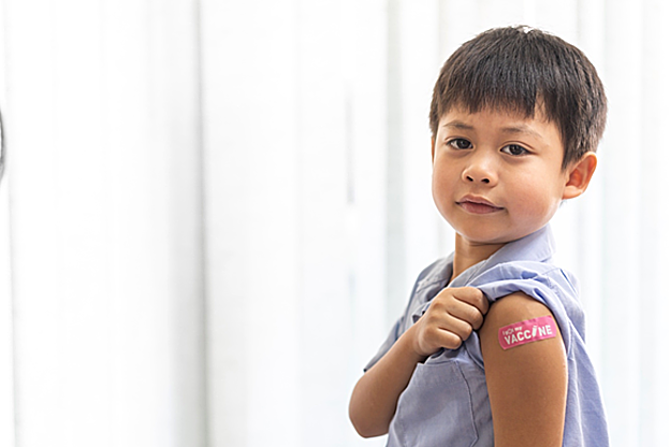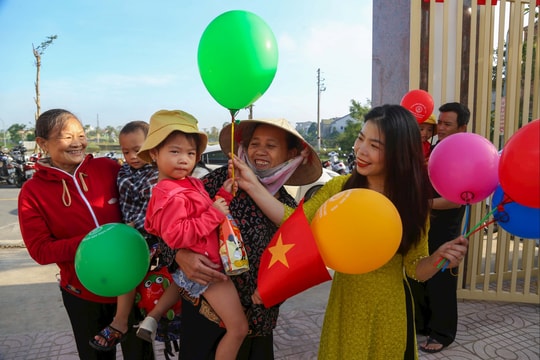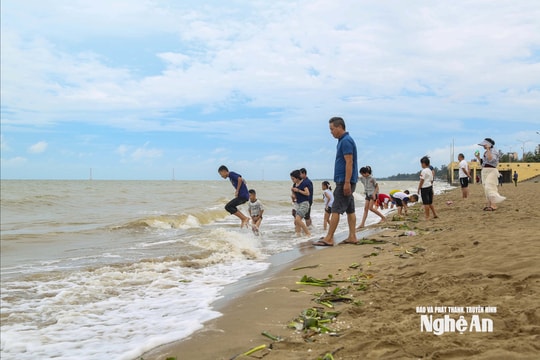Dos and Don'ts for Children 5-11 Years Old Getting the Covid-19 Vaccine
Parents should not give their children painkillers before getting the Covid-19 vaccine, avoid letting their children get hungry, and need to closely monitor their children's health for 3-7 days after the injection.
According to the Ministry of Health, about 8.2 million children aged 5-11 nationwide are preparing to receive the Covid-19 vaccine. The two vaccines used to vaccinate young children are Moderna and Pfizer, both using mRNA technology, so the reactions after vaccination are similar.
Associate Professor, Dr. Nguyen Tien Dung - Former Head of the Department of Pediatrics, Bach Mai Hospital said that every child has a certain risk of severe Covid-19 and hospitalization. Therefore, vaccination will help minimize the risk, so that children can go to school and participate in social activities with peace of mind, reduce infection, and ensure social immunity. However, to ensure the vaccination process goes smoothly, Associate Professor, Dr. Nguyen Tien Dung advises parents to pay attention to the following.
Things not to do
Misrepresenting the child's age: According to vaccination regulations, children can only be vaccinated when they are old enough, not children under the age. The reason is that all vaccines are tested to determine safety and effectiveness according to the prescribed age.
There is currently no research that determines that the Pfizer vaccine fully meets safety and effectiveness standards for vaccination in children under 5 years old.
"Therefore, when taking children for vaccination, parents should declare the correct age of their child. Do not declare falsely because you are eager to get your child vaccinated early or think that your child is only a few months short of turning 5 years old so you can get vaccinated. Vaccination at the wrong age is not effective in preventing diseases for children and can also affect their health," Associate Professor, Dr. Nguyen Tien Dung emphasized.
 |
| It is necessary to monitor the baby's body after the injection to have a timely treatment plan. Photo: Shutterstock |
Failure to declare underlying diseases and allergy history of children: According to regulations of the Ministry of Health, there are factors that need to be considered in screening examination before vaccination for children. In particular, vaccination must be delayed for children with acute and chronic progressive diseases; caution must be exercised when vaccinating children with a history of allergy to any allergen, children with perceptual disorders, behavioral disorders. Children with congenital or chronic diseases of the heart, lungs, digestive system, urinary system, blood, abnormal heart, lungs, grade 3 or higher anaphylaxis to any allergen must be transferred for screening and vaccination to the hospital.
In particular, after the first injection or if the child is found to have an anaphylactic reaction to the components of the Covid-19 vaccine, the same type of vaccine is contraindicated. Children who have had Covid-19 should delay vaccination for 3 months from the date of onset of the disease.
Therefore, parents need to clearly understand their child's medical history and declare it in detail so that the screening and vaccination process is safe, avoiding unfortunate side effects after vaccination, affecting the child's psychology and health.
Giving children painkillers before injection: Because of fear of side effects after injection such as fever, pain, muscle fatigue... affecting children's health, many parents give their children painkillers before injection.
According to Associate Professor Dr. Nguyen Tien Dung, this is not recommended. The recommendation of the US Centers for Disease Control (CDC) states that using these drugs does not reduce side effects after vaccination. On the contrary, it can worsen symptoms or reduce the effectiveness of the vaccine.
Things to do
Before taking your child to get the Covid-19 vaccine, parents should carefully research the program, location, and local vaccination regulations. Each locality will have its own regulations on vaccination times for each area, declaration procedures, and epidemic prevention regulations. Therefore, parents should contact local management officials to arrive on time, avoid crowds, and declare according to the correct procedures.
Associate Professor, Dr. Nguyen Tien Dung noted that parents need to talk to their children about vaccination, explain to them the importance of vaccination and common reactions after vaccination so that children do not worry too much. Before vaccination, children should be fed, avoid vaccination when children are hungry and after vaccination, wait 30 minutes at the vaccination site to monitor for post-vaccination reactions.
Parents also need to prepare pain relievers and fever reducers suitable for children. According to Associate Professor, Dr. Nguyen Tien Dung, the vaccine is an antigen, when entering the body it will create an immune response, so in some cases there may be some mild side effects such as fever, pain at the injection site, headache, muscle pain... Among these side effects, fever is a symptom that parents can easily recognize by regularly checking the child's temperature. In case the child has a fever of 38.5 degrees Celsius or higher, the child can be given pain relievers such as paracetamol at a dose of 10-15mg/kg/time, each time 4-6 hours apart.
Parents can choose Hapacol fever reducer of Hau Giang Pharmacy for convenience because the medicine is pre-divided into doses according to weight and age. For children from 16-25kg, you can choose Hapacol 250 containing 250mg of paracetamol; choose Hapacol 325 containing 325mg of paracetamol for children from 26-32kg; children from 33-50kg can choose Hapacol effervescent with 500mg of paracetamol. In particular, Hapacol 250 of Hau Giang Pharmacy also has an orange scent, sweet taste and is produced in the form of soluble effervescent powder to help diffuse the drug molecules to dissolve quickly and increase the fever-reducing effect when entering the body.
Side effects usually appear and disappear after a few hours to 24 hours after the injection. Therefore, parents need to monitor their children's symptoms to intervene promptly. Depending on their constitution, children will have different reactions of different severity. If the child has a high fever that does not respond to antipyretics, accompanied by some symptoms such as rapid heartbeat, shortness of breath, fainting... they need to be taken to a medical facility immediately.
Parents need to continue to closely monitor their child’s health for 3-7 days. If they see that their child is completely healthy, eating and playing normally, parents can rest assured.


.jpg)




.jpg)
